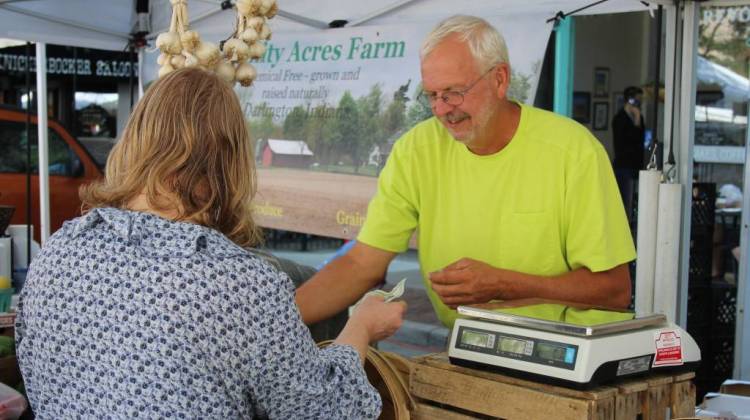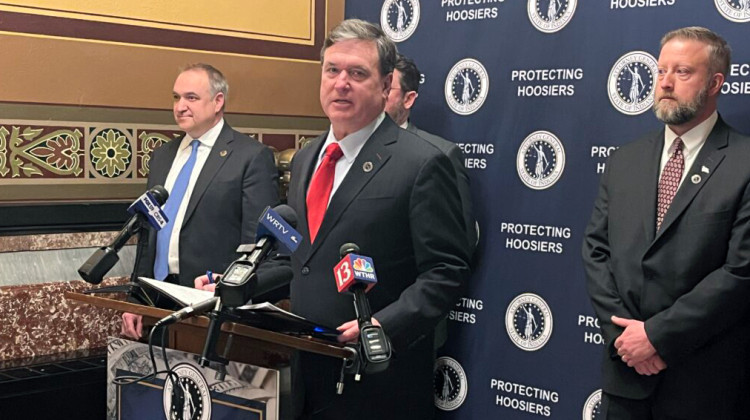
Montgomery County-based grower Gary Cox makes change for a customer in his Trinity Acres Farm tent at the Lafayette Farmers Market.
Annie Ropeik/IPB NewsNew regulations for how big farms handle raw produce won’t affect the hundreds of vendors that sell at Indiana farmers markets.
But small-scale growers still have plenty of rules to follow.
In a trailer at the Lafayette Farmers Market, Graham Rider digs through a freezer stuffed with plastic packages of frozen meat. His family owns Thistle Byre Farm in Burnettsville.
“Here’s our thermometer,” Rider says, pulling it out from beneath totes of ground beef and lamb. “Oh, good. It’s below 20.”
This is one way his family keeps their food in line with state rules when selling at the farmers market. The regulations are mostly common-sense, Rider says: basic labeling, keeping frozen foods cold enough or prepared foods hot enough, and washing and sorting raw produce.
All that is enforced by the Tippecanoe County Health Department. Along with a full load of other restaurants and stores, they say they surprise-inspect each local farmers market twice a season.
Rider says the inspector checks everything from the temperature inside the freezers – they bring their own thermometer, he says – to “general cleanliness” inside the meat trailer and at the produce table.
“They [have] a checklist of things they’re looking for. I mean, honestly, we’d probably get some demerits on dirty floor,” Rider says, scuffing the plywood with his shoe.
Most Hoosier farms are like Thistle Byre – they don’t sell enough, or over a large enough area, to qualify for the strictest standards on things like raw produce.
Purdue University food scientist Amanda Deering estimates only 60 or 70 farms out of about 2,000 in Indiana will have to comply with the latest version of those rules, under the Food Safety Modernization Act.
“These are the growers who are shipping multi-state,” she says. “They’re growing a variety of different commodities. It’s our large cantaloupe growers, watermelon growers and then others that are producing other fruits and vegetables.”
In the next few years, she says, the big growers of anything meant to be eaten raw will have to meet new standards for training and storage, water and soil use and testing, and, most importantly, record-keeping.
“A lot of it isn’t new to them, especially the big guys that are going to be covered by the produce rule,” Deering says. “But just keeping all these records, I think, is going to be one of the harder things.”
It will also be costly. Deering says that’s why the new rule doesn’t apply to small growers.
“That’s one thing that will never go away, is that people can always buy direct from the farmer,” she says. “And the farmers market is just a way to facilitate that direct-to-consumer sale.”
Back at the Lafayette market, which runs from May to October, Gary Cox of Trinity Acres Farm in Darlington is greeting customers, weighing and bagging veggies and making change.
In early August, he had a bounty of organic vegetables spread across his table: five kinds of tomatoes, three kinds of kale, basil, zucchini, hot and bell peppers, and more.
He says he learned how to handle his produce properly through “hearsay,” and can’t remember ever being inspected. He says he’s not even sure who makes the rules, but he knows what they are:
“We go out and harvest, and then it’s washed and packed within the hour,” he says. “And then we’d refrigerate it – most of it.”
Cox says that’s the advantage for consumers at a farmers market:
“Freshness – they’re gonna get it fresher,” he says. “The less it’s handled, the fresher it’s gonna be.”
Nearby, Sharon Morphew carefully selects some of Gary Cox’s fresh potatoes for a cookout she’s having that night. She says she doesn’t think much about how this produce was handled.
“I wash ‘em when I get home, so I’m not worried,” she says, laughing.
Traditional farmers markets like Lafayette’s probably won’t face other regulatory changes soon.
With the new federal rules in place for big growers, state reforms are focused on other kinds of agribusiness – mainly wineries and breweries.
 DONATE
DONATE









 Support WFYI. We can't do it without you.
Support WFYI. We can't do it without you.